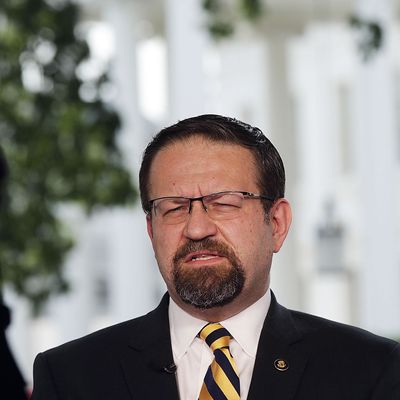
Every American intelligence agency believes that Russia tried to subvert our country’s democratic process in 2016. Presumably, so do Donald Trump Jr. and Jared Kushner, seeing as they (at least) tried to participate in that subversion. And the Trump White House officially accepts the verdict rendered by the intelligence community and Donald Jr.’s old emails.
For some strange reason, however, the president appears physically incapable of publicly condemning Russia’s efforts.
Virtually every member of Congress believes that the Kremlin’s attempt to compromise our election merits retaliatory sanctions. But the Trump White House apparently thinks that the best way to prevent Russia from meddling in our elections again is to make sure that Moscow suffers no lasting punishment for its previous interference. Last December, the Obama administration seized two Russian diplomatic compounds in retaliation for those efforts. Trump has, reportedly, been trying to find a way to give those back since his very first days in office.
On Thursday, Jake Tapper asked the White House’s senior cable news surrogate Sebastian Gorka to explain the administration’s reasoning.
“We want to give collaboration and cooperation a chance,” Gorka explained. “The fact is we may not share the same philosophy, we may not share the same type of statesman view of the world but the fact is there are some issues of common concern.”
When Tapper suggested that such a policy would amount to rewarding a foreign power for interfering in our domestic affairs, Gorka replied, “Jake, I’d ask you the question: Do you wish us to have bad or deteriorating relations with the nuclear power that is the Russian federation?”
“The United States doesn’t dole out rewards to countries because they possess a nuclear weapon,” Tapper observed.
Gorka insisted that Trump was right to approach global affairs from a pragmatic viewpoint rather than pursue the “disastrous ideologically tinged lack of statesmanship” of the Obama White House.
“You don’t think it’s weak at all to let Russia go after having interfered in the 2016 election with no punishment at all?” Tapper asked.
Gorka chuckled before replying, “The last thing you could say about Donald J. Trump … is that he’s weak.”
Apparently, this exactly the kind of of rapier wit that the president is looking for in his spokespeople. As Axios reports:
Gorka’s stock has soared as President Trump has watched him on various cable channels fighting with the hosts and accusing them of being part of the “fake news industrial complex.”
Before Trump left for Paris yesterday evening, he was asking West Wing staff, “Did you see Gorka? So great, I mean really, truly great.” Trump loved, in particular, when Gorka told CNN morning host Alisyn Camerota that more people are interested in cartoons than CNN, and that the network’s ratings are lower than “Nick at Nite.”
Gorka came into the White House as a terrorism analyst, one who would advise (one-time National Security Council member) Steve Bannon. But Gorka boasts no genuine expertise on Islamic extremism. He does, however, know a thing or two about how to use a posh accent to convince stupid people to believe lies. And the Trump administration will surely have plenty of use for that service for a while yet.






























